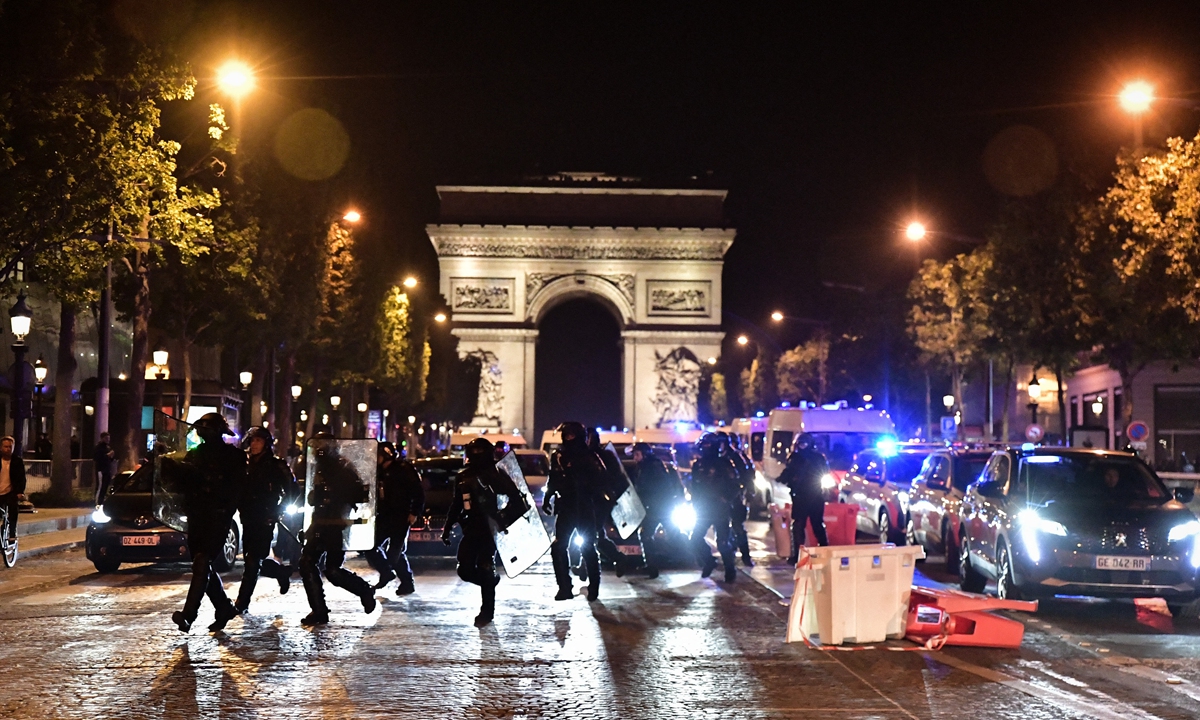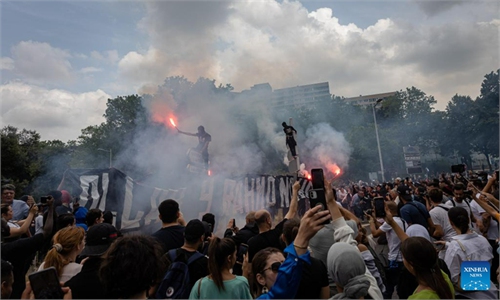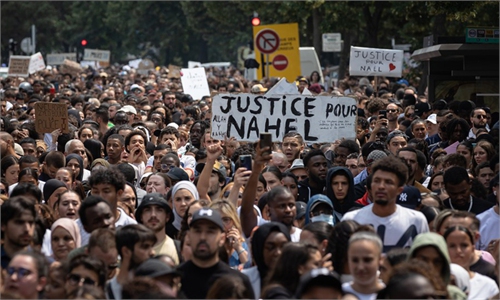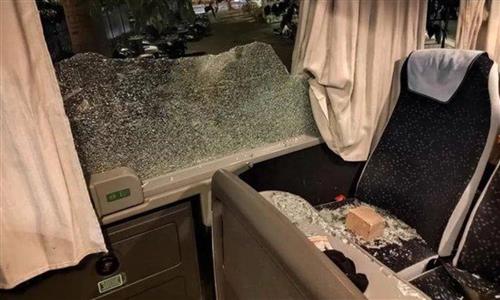France riots ‘caused by long-standing problems,’ a test for Macron to deal with complex challenges
Unrest impacts more European countries, Chinese tourists concerned

Clashes occur between rioters and police in Paris, on July 2, 2023, after the death of a 17-year-old boy killed by police in Nanterre in the suburbs of Paris on June 27, 2023.Photo: IC
The impacts of massive riots across France continue as French President Emmanuel Macron postponed a state visit to Germany that was to begin on Sunday, with 45,000 police being deployed to handle the situation and hundreds of people arrested. Chinese nationals and observers who work and live in France said the damage and impacts are extensive and that French people hope public order can be restored, and that attacks against innocent civilians and public facilities are unacceptable.Chinese tourists who plan to visit France are concerned about the riots, as the Chinese Foreign Ministry on Sunday warning about the current security situation in France. Chinese analysts said the current massive riots are caused by the long-standing issue of immigrants and the worsening economic situation of Europe due to the Ukraine crisis, and given Macron's recent attempt to seek more strategic autonomy and multi-polarization of the world order that has offended the forces that support a hegemonic unipolar order, some Western forces may play a certain role behind.
Currently, not only France, but also other European countries including Switzerland and Belgium have seen similar unrest and violence, media reported. Experts said this means the fundamental reason behind these riots could be a shared challenge for EU members, and it would be a test for France, as well as the EU, to handle the complicated situation.
Dangerous situation
French police arrested at least 719 people during a fifth night of uprisings across the country on Saturday night following the funeral of 17-year-old Nahel M, who was of North African descent, earlier that day. The interior ministry of the country said that the level of violence "appeared to have declined" since anger first broke out after the teenager was shot dead by a police officer during a traffic stop in the Paris suburb of Nanterre on Tuesday, according to France 24.
Song Luzheng, a Paris-based Chinese scholar and an expert on political studies at the China Institute of Fudan University, told the Global Times on Sunday that "the riots have so far mainly impacted communities that mainly consist of Muslims and Arabic or African immigrants. Public transportation systems like subways and buses have been attacked, and scenic spots and shopping centers are also being targeted by the rioters who want to use the chaos to cover up their looting attempts."
Communities with few immigrants are still safe in general so far and many people have become accustomed to this kind of situation as riots and unrest are not rare in France. They believe the situation will return to normal eventually, even though they don't believe the problem of immigrants and police violence can be fundamentally solved, Song said.
Jin Liang, a Paris-based Chinese journalist who has conducted live reports over the situation in recent days, told the Global Times that the situation is "as bad as battlefields, and even more chaotic." He said that when he reports the news on the spot, in order to ensure safety, he and his colleagues always stand behind the defensive police line.
The riots have impacted the diplomatic activities of the national leader of France. According to Reuters on Saturday, Macron postponed a state visit to Germany that was to begin on Sunday. It was the second time this year that unrest in France has forced Macron to postpone high profile encounters with a head of state after Britain's King Charles canceled a visit due to protests over pension legislation earlier this year.
Foreigners in France, such as Chinese tourists, are also facing danger. On Friday, a bus carrying 41 Chinese tourists was attacked by a group of black-clad rioters in the southern city of Marseille. On Sunday, the Chinese Foreign Ministry warned Chinese nationals in France to strengthen their personal, vehicle, residence and shop security, to call the police and contact the Chinese Embassy or Consulates in France in case of emergencies.
British holidaymakers traveling to France have also been warned they could face disruption, according to the Guardian on Saturday. The Foreign Office of the UK has changed its travel advice, warning of the potential for disruption to travel, curfews and that the "location and timing of riots are unpredictable."
Some Chinese travel agencies reached by the Global Times said they are paying close attention to the situation but they will not cancel trips to France at the moment, but will adjust the travel itineraries based on the development of the situation as they consider the riots are accidental incidents and will not last for long.
Complicated reasons
The riots this time have been caused directly by a killing of a North African teenager by the French police, and it might seem like an accident, but in fact, the massive nationwide riots are actually caused by long-standing and complicated problems in France, so from this aspect, the current riots are unavoidable in this society, Zheng Ruolin, an expert on French studies and a research fellow at the China Institute of Fudan University, told the Global Times on Sunday.
France and many other European countries have taken in a large amount of immigrants and refugees from the developing countries in past decades, and after the "Arab Spring" and the wars and chaos caused by the US-led Western powers in the Middle East, the number of immigrants and refugees who fled to Europe has increased significantly. This has already caused tensions between people with different cultural, ethnic and religious backgrounds, as well as the tension between the police and immigrants, in many Western countries, experts said.
After the Ukraine crisis broke out in 2022, the long-standing problem faced new challenges as the hopes of an economic recovery after the COVID-19 pandemic were seriously damaged. Rising energy prices and the worsening security situation and business environment led to rising unemployment and anger among the lower-classes, mostly immigrants from Arab and African countries, analysts said.
Therefore, "just a spark could detonate this huge powder keg," and not only in France, but in many other European countries including Germany, Belgium, Sweden, the Netherlands and Switzerland, which all share similar challenges. This is why the whole of Europe is paying close attention to how the situation develops, Song noted.
Some observers said that as Macron has made a series of moves independent from the US, such as calling for strategic autonomy of the EU and distancing France from US foreign policy related to China, some forces may play a role behind the current riots to make trouble for and impose pressures on the Macron government.
Zheng said there is no clear evidence now to prove this kind of speculation, but the concern is reasonable, because in history, when France follows policymaking that the US does not like, some riots would occur in the country, such as the riots in May 1968 during the term of Charles de Gaulle, and the 2005 French riots during the term of Jacques Chirac. "The current riots show some characteristics of color revolutions, such as the use of social media networks among rioters and the violence driven by some seditious political slogans."
Song said if the riots spill over to more European countries, this will significantly undermine the Western bloc to stay united in supporting Ukraine to confront Russia, so using the riots to incite more turmoil in France at the moment would be unwise for those forces.





